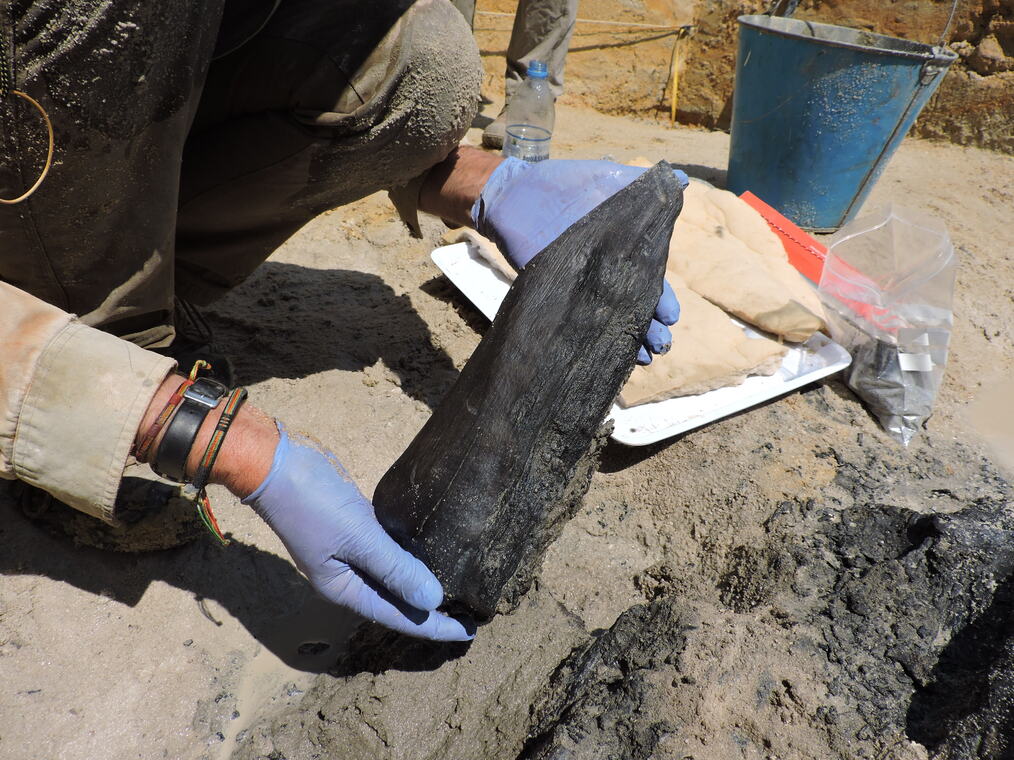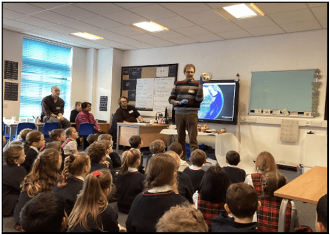
Deep Roots of Humanity Project
Welcome to the Deep Roots of Humanity project, an investigation of early technological change in south-central Africa.
We are an international and interdisciplinary team of researchers examining a fundamental change in the way early humans planned and made tools. The time period spans 500,000 years to 300,000 years ago (the Early to Middle Stone Age transition). During this period a new way of creating tools emerged which we rely on today for making most everything we use.
For the first time in human history tools were made by combining two or more parts to make a single tool. Sounds simple but it was a revolutionary idea: everyday actions such as cutting, scraping, chopping, drilling and piercing were made more efficient with the addition of a handle. Imagine using a screwdriver which didn’t have a handle or try chopping down a tree with an axe blade, but with no handle. You’ll soon appreciate the advantages of hafting (the process of combining parts into a functioning whole).
The Deep Roots team is working to determine when this invention took place in what is now Zambia and put the Zambian evidence in the broader context of the Early to Middle Stone Age transition in Africa. We are also interested in why the invention of hafting came about when it did. Did climate change play a role, and were there regional differences in the take-up of this technology? Afterall, the large hand-held tools of the Early Stone Age, such as handaxes and cleavers, had been the standard tools for well over a million years. Why change what does the job? These are some of the basic questions driving our research.
We are documenting our research in more detail on the Deep Roots project website.
Excavating the evidence
Our five year programme of excavation and research aimed to enrich the database of evidence from existing African archaeological records, expand its geographical coverage and serve as a model which future researchers can adapt to locations in other parts of Africa.
Between 2017 and 2022 an interdisciplinary team worked in Zambia excavating in three key locations:Victoria Falls
Kalambo Falls
Previous excavations have found evidence in these places for the Early to Middle Stone Age transition (Mode 2/Mode3). This transition pre-dates the evolution of Homo sapiens and is characterised by a radical change in the way tools were imagined and made, with multiple parts combined into a whole. This is known as hafting or combinatorial technology.
Everything we make today is produced using tools made using other tools made of multiple parts. This research aims to unravel when and why this fundamentally new way of thinking about technology occurred. Part of understanding this transformation is learning what advantages this technology offered over older ways of making tools.
 |
| Well preserved wood being recovered from Early Stone Age deposits at Kalambo Falls, Zambia. |
Fieldwork, April 2022
The videos here are from our final brief season of fieldwork in April 2022 when we returned to the area of Victoria Falls, a World Heritage Site, where we the project had started in 2017. The aim was to collect sediments from our excavations for environmental analyses and to record an area excavated in 1950 by Prof Desmond Clark. This excavation is located just near the entrance to the falls and a museum was built over the site. The deep pit preserves a long Stone Age sequence, including the important Early to Middle Stone Age transition, but baboons had found their way in and the excavations needed to be tidied up.
On our final morning before heading to the airport we explored a new area beyond the town of Livingstone and made an unexpected discovery. We share with you those early moments of excitement.
Expert crafting, local knowledge and
educational resources
The project has gathered information from local communities living near Victoria Falls and Kalambo Falls about plants that are used today for making handles for tools and adhesives for attaching cutting edges to the handles. This information has fed into our experimental work and helped us replicate hafted tools that work well in cutting, chopping, scraping and digging – basic tasks today and in the past.
Our use-wear specialists are using this information as a reference collection for interpreting evidence that survives on the stone tools excavated from waterlogged deposits at Kalambo Falls.
For those living near our excavations there were open days for the public, and especially for school groups to see the work in progress and handle artefacts.
We are currently providing activity sessions for local primary schools in the Liverpool region, helping teachers and their students to understand the importance of the development of hafting to our lives today. A longer-term aim is to make the knowledge gained from the project accessible for teachers in Zambia to use as part of the junior secondary school curriculum in the teaching of human evolution and climate change.
A recent activity session took place on Thursday 16th February, where Professor Larry Barham, Dr. Peter Hommel and students from the Archeology Department visited a school and provided an introduction to Living in the stone age. The class learnt about the importance of handles and hafts to the development of human societies, where they had the opportunity to handle some artefacts and replicas themselves. Students also conducted a chromatography experiment to see how ancient glues were made.


Our team
Our international team of researchers includes:
archaeologists - expert in innovative approaches to the study of stone tool use, notably use-wear and residue analysis
geographers - to help us understand the formation of the sites
geoscientists - who can date the deposits.
Find out more about us: Larry Barham (Liverpool, UK),
Ian Candy (Royal Holloway, University of London, UK)
Geoff Duller (Aberystwyth, UK)
Andy Hein (Edinburgh, UK)
Maggie Katongo (Livingstone Museum, Zambia)
Karl Lee (professional technologist, UK)
Perrice Nkombwe (Moto Moto Museum, Zambia)
Veerle Rots (Liège, Belgium)
Noora Taipale (TraceoLab, University of Liege),
Dave Thomas (Oxford, UK)
Sumiko Tsukamoto (Hannover, Germany)
The Deep Roots of Humanity project is funded by the Art & Humanities Research Council, UK (grant AH/N08804/1)

Deep Roots blogs
Larry Barham blogs about what it's like to excavate in Zambia, as he heads off to begin his research into stone age tools.
No comments:
Post a Comment